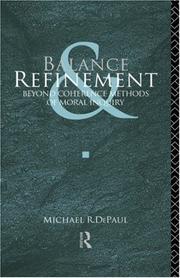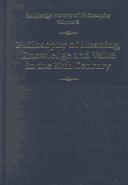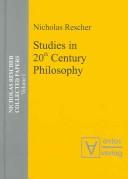| Listing 1 - 10 of 394 | << page >> |
Sort by
|

ISBN: 1134952325 1282373242 9786612373244 0203004183 9780203004180 9780415042208 0415042208 0415042208 9781134952274 9781134952311 9781134952328 9780415522069 1134952317 Year: 1993 Publisher: London New York Routledge
Abstract | Keywords | Export | Availability | Bookmark
 Loading...
Loading...Choose an application
- Reference Manager
- EndNote
- RefWorks (Direct export to RefWorks)
We all have moral beliefs. But what if one beleif conflicts with another? DePaul argues that we have to make our beliefs cohere, but that the current coherence methods are seriously flawed. It is not just the arguments that need to be considered in moral enquiry. DePaul asserts that the ability to make sensitive moral judgements is vital to any philosophical inquiry into morality. The inquirer must consider how her life experiences and experiences with literature, film and theatre have influenced her capacity for making moral judgments and attempt to ensure that this capacity is neither naive
Book
ISBN: 1773854593 1773854569 Year: 2023 Publisher: Calgary : University of Calgary Press,
Abstract | Keywords | Export | Availability | Bookmark
 Loading...
Loading...Choose an application
- Reference Manager
- EndNote
- RefWorks (Direct export to RefWorks)
Beginning in 1963 and continuing through the late 1980s, a loose coterie of like-minded Canadian poets challenged the conventions of writing and poetic meaning by fusing their practice with strategies from visual art, sound art, sculpture, installation, and performance. They called it “borderblur.” Borderblur Poetics traces the emergence and proliferation of this node of poetic activity, an avant-garde movement comprising concrete poetry, sound poetry, and kinetic poetry, practiced by poets and artists like bpNichol, bill bissett, Judith Copithorne, Steve McCaffery, Penn Kemp, Ann Rosenberg, Gerry Shikatani, Shaunt Basmajian, among others. Author Eric Schmaltz demonstrates how these poets formed an alternative tradition, one that embraced intermediality to challenge the hegemony of Canadian literature established during the heydays of cultural nationalism. He shows the importance of intermediality as a driving cultural force and how its proliferation significantly altered Canadian cultural expression. Drawing on a combination of archival research, historical analysis, and literary criticism, Borderblur Poetics adds significant nuance to theories and criticisms of Canadian literature.

ISBN: 0429237235 020382282X 1299285767 1136767428 9780203822821 0415056055 9780415056052 0415308828 9780415308823 9780203030684 9781134935680 9781134935727 9781134935734 9781136767425 9781136767371 9781136767418 9781138143197 113676741X Year: 2004 Publisher: London
Abstract | Keywords | Export | Availability | Bookmark
 Loading...
Loading...Choose an application
- Reference Manager
- EndNote
- RefWorks (Direct export to RefWorks)
The twentieth century brought enormous change to subjects such as language, metaphysics, ethics and epistemology. This volume covers the major developments in these areas and more.

ISBN: 3110326264 9783110326260 9783110325348 3110325349 3937202781 9783937202785 Year: 2013 Volume: 1 Publisher: Berlin Boston
Abstract | Keywords | Export | Availability | Bookmark
 Loading...
Loading...Choose an application
- Reference Manager
- EndNote
- RefWorks (Direct export to RefWorks)
Set of studies of various movements and developments in 20th century philosophy in which Nicholas Rescher was involved as a participant.
Book
ISBN: 3110705621 3110705524 Year: 2021 Publisher: München ; Wien : De Gruyter Oldenbourg,
Abstract | Keywords | Export | Availability | Bookmark
 Loading...
Loading...Choose an application
- Reference Manager
- EndNote
- RefWorks (Direct export to RefWorks)
In den 1960er Jahren wurde "Entwicklung" zu einem universalen Ziel und umkämpften Politikfeld im Spannungsverhältnis von Kaltem Krieg, Dekolonisierung und konkurrierenden Sozialismen. Die Regierung Tansanias setzte beim Aufbau eines eigenständigen Afrikanischen Sozialismus auch auf Expertise, Kredite und Stipendien aus Ost und West. Diese Unterstützung galt als Notwendigkeit, aber auch als Bedrohung, konnte es sich beim Entwicklungspersonal aus kapitalistischen und kommunistischen Ländern doch immer um "trojanische Pferde" handeln. Wie übersetzten sich die Rivalitäten und konkurrierenden Ideen tatsächlich in die Praxis? In globalhistorischer Perspektive diskutiert dieses Buch Felder, Akteure und konkrete Arenen der Entwicklungsarbeit anhand der entwicklungspolitischen Verflechtungen zwischen Tansania und den beiden deutschen Staaten. Auf der Grundlage umfangreicher neu erschlossener Aktenbestände in deutschen und tansanischen Archiven sowie über 100 Interviews zeichnet es die Handlungsspielräume in der globalen Entwicklungsarbeit multiperspektivisch nach und zeigt auf, wie visionäre Zukunftsentwürfe in Politik und Alltag immer mehr dem Primat ökonomischer Krisenbewältigung wichen. Tanzania's efforts to construct an independent "African socialism" were part of a global discussion about the royal road to development, the ambiguous role of capitalist "developmental assistance," and the nature of "solidarity" with communist states. The study discusses negotiative processes and day-to-day experiences amid the global tensions of the Cold War, decolonization, and competing socialisms.
HISTORY / Modern / 20th Century. --- African History. --- Development Policy. --- German History.
Book
ISBN: 1282555065 9786612555060 9780254004093 0253004098 9780253004093 9780253003560 0253003563 9780253352149 0253352142 9780253353597 0253353599 Year: 2009 Publisher: Bloomington, IN Indiana University Press
Abstract | Keywords | Export | Availability | Bookmark
 Loading...
Loading...Choose an application
- Reference Manager
- EndNote
- RefWorks (Direct export to RefWorks)
In this second volume of his history of naval power in the 20th century, H. P. Willmott follows the fortunes of the established seafaring nations of Europe along with two upstarts-the United States and Japan. Emerging from World War I in command of the seas, Great Britain saw its supremacy weakened through neglect and in the face of more committed rivals. Britain's grand Coronation Review of 1937 marked the apotheosis of a sea power slipping into decline. Meanwhile, Britain's rivals and soon-to-be enemies were embarking on significant naval building programs that would soon change the natur
Book
ISBN: 1800857373 Year: 2021 Publisher: [s.l.] : Liverpool University Press,
Abstract | Keywords | Export | Availability | Bookmark
 Loading...
Loading...Choose an application
- Reference Manager
- EndNote
- RefWorks (Direct export to RefWorks)
In The Postcolonial African Genocide Novel, Chigbo Anyaduba examines fictional responses to mass atrocities occurring in postcolonial Africa. Through a comparative reading of novels responding to the genocides of the Igbo in Nigeria (1966-1970) and the Tutsi in Rwanda (1990-1994), the book underscores the ways that literary encounters with genocides in Africa's postcolonies have attempted to reimagine the conditions giving rise to exterminatory forms of mass violence. The book concretizes and troubles one of the apparent truisms of genocide studies, especially in the context of imaginative literature: that the reality of genocide more often than not resists meaningfulness. Particularly given the centrality of this truism to artistic responses to the Holocaust and to genocides more generally, Anyaduba tracks the astonishing range of meanings drawn by writers at a series of (temporal, spatial, historical, cultural and other) removes from the realities of genocide in Africa's postcolonies, a set of meanings that are often highly‐specific and irreducible to maxims or foundational cases. The book shows that in the artistic projects to construct meanings against genocide's nihilism writers of African genocides deploy tropes that while significantly oriented to African concerns are equally shaped by the representational conventions and practices associated with the legacies of the Holocaust.
History / Modern / 20th Century --- Literary Criticism / African --- Literary Criticism / Modern / 20th Century --- Literature --- History and criticism --- Appraisal of books --- Books --- Evaluation of literature --- Criticism --- Literary style --- Appraisal --- Evaluation

ISBN: 0714845566 9780714845562 Year: 2005 Publisher: London Phaidon
Abstract | Keywords | Export | Availability | Bookmark
 Loading...
Loading...Choose an application
- Reference Manager
- EndNote
- RefWorks (Direct export to RefWorks)
Conceptual art --- Art, Modern --- Conceptual art - Italy. --- Art, Modern - 20th century - Italy. --- Arte povera
Book
ISBN: 0804792984 9780804792981 9780804786249 0804786240 9780804792950 080479295X Year: 2014 Publisher: Stanford, California
Abstract | Keywords | Export | Availability | Bookmark
 Loading...
Loading...Choose an application
- Reference Manager
- EndNote
- RefWorks (Direct export to RefWorks)
As long as we care about suffering in the world, says political philosopher Simona Forti, we are compelled to inquire into the question of evil. But is the concept of evil still useful in a postmodern landscape where absolute values have been leveled and relativized by a historicist perspective? Given our current unwillingness to judge others, what signposts remain to guide our ethical behavior? Surveying the nineteenth- and twentieth-century Western philosophical debates on evil, Forti concludes that it is time to leave behind what she calls "the Dostoevsky paradigm": the dualistic vision of an omnipotent monster pitted against absolute, helpless victims. No longer capable of grasping the normalization of evil in today's world—whose structures of power have been transformed—this paradigm has exhausted its explanatory force. In its place, Forti offers a different genealogy of the relationship between evil and power, one that finally calls into question power's recurrent link to transgression. At the center of contemporary evil she posits the passive attitude towards rule-following, the need for normalcy, and the desire for obedience nurtured by our contemporary mass democracies. In our times, she contends, evil must be explored in tandem with our stubborn desire to stay alive at all costs as much as with our deep need for recognition: the new modern absolutes. A courageous book, New Demons extends an original, inspiring call to ethical living in a biopolitical age.
Book
ISBN: 1783378514 9781783378517 9781783376902 1783376902 1781590931 9781781590935 Year: 2012 Publisher: Barnsley, South Yorkshire Praetorian Press
Abstract | Keywords | Export | Availability | Bookmark
 Loading...
Loading...Choose an application
- Reference Manager
- EndNote
- RefWorks (Direct export to RefWorks)
In this compelling study of leadership, Correlli Barnett examines the strengths and weaknesses of twenty leaders in the nineteenth and early twentieth centuries. He examines how the difficulties they faced and the political and strategic backgrounds of their days and analyses how they performed and what they achieved. Were they successful, or were they beaten down by the burden of their roles? His book considers men from very different backgrounds and from three continents in a range of modern conflicts from the Napoleonic Wars to the Second World War. They range from statesmen like Napoleon,
| Listing 1 - 10 of 394 | << page >> |
Sort by
|

 Search
Search Feedback
Feedback About UniCat
About UniCat  Help
Help News
News